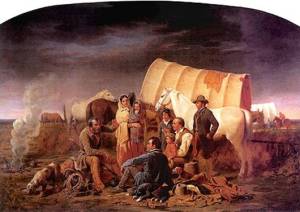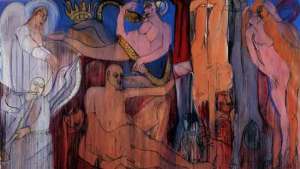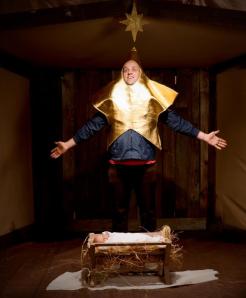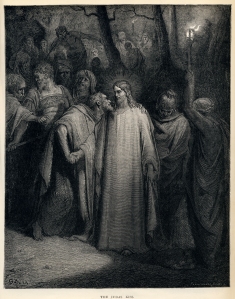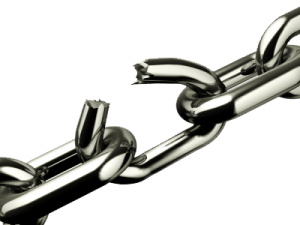Announcing a New Blog!
Hi everyone! I’m excited to announce my new blog project called Into the Hills. I’ll be posting over there now…and more frequently, I hope!
Go check it out.
Sacrament Meeting Talk: Pioneers
Today, I gave a talk in Sacrament Meeting for Pioneer Day. Here is the text…
Homosexuality: The One Sin that’s Different?
Thanks to the Club Unicorn post that’s been making waves on Facebook, I’ve been involved in several (hopefully) positive conversations about the nature of homosexuality and the predicament Mormon LGBT folks find themselves in. Whatever you think of that post (I have mixed feelings), I think it’s a net-positive that it’s sparked so much discussion among LDS people.
So here’s another conversation to add to the pile…
If homosexuality is sin, why is it sin — and how?
The argument typically goes like this: sexuality is given to humanity for expression in marriage between a man and a woman. Homosexuality falls outside these boundaries, therefore it is sin. It is like alcoholism or a propensity toward violence because it is a natural urge of which God has forbidden expression. Like other impulses of the “natural man,” we might feel drawn to certain behaviors, but that doesn’t make acting on the impulse justifiable or correct.
This is an argument I myself espoused for many years. But then I took a closer look and realized that I had failed to take note of some critical differences.
First, consider the nature of sexuality itself. I think we can all agree that sexuality is not inherently evil; at worst we might say it is morally neutral, a power humanity has been given to exercise for good or ill. At best (and I think a strong argument can be made for this), it’s inherently good.
Contrast this with urges toward addiction or violence, or other urges symptomatic of the “natural man,” such as avarice, hatred, or judgment. These natural inclinations necessarily lead to destructive ends. There is no situation where addiction is healthy. There is no situation where violence is the best answer. There is no situation where hatred can be used positively. There is no situation where it’s correct to envy or condemn. That’s not the case for sex. Sexual urges are something fundamentally different from these other urges (which I like to call “diabolical” vices).
Please note that, in and of itself, this doesn’t make homosexuality right — it just makes questions of sexuality DIFFERENT from cases of addiction or violence. We can all think of circumstances where sexuality is used in destructive ways. But a closer examination reveals that this tends to happen when sexuality is tied up in one of the diabolical vices: sexual coercion is violence; sexual addiction is, well, addiction; lust is the de-humanizing of someone made in the image of God and reducing them into an object for personal gratification; infidelity is dishonesty and betrayal. The list goes on.
Which of the diabolical vices is homosexuality attached to? Dead serious question. Because I can’t find one.
Not only that, Jesus said, “By your fruits ye shall know them.” When I examine committed, mature homosexual relationships, I see the same kind of fruit emerging as in committed, mature heterosexual relationships. I see people who are willing to sacrifice, work together, and grow together to become something greater as a couple than they could be alone. I see stability and peace. I see the transformation that comes from sharing a life with others.
I can’t think of any other sin that allows people to thrive like this. And I’m not just talking about succeeding in a material way. I mean gay people thrive in a holistic, mature, spiritual way when they are free to love and form life partnerships analogous to heterosexual marriages. Can you think of another “sin” that produces such good fruit? Because I’ve wracked my brain over this and I’m coming up blank.
Please note that I’m not arguing that sexual sin doesn’t exist, nor am I arguing that homosexuals can’t commit it. We’re all capable of lust, sexual aggression, and infidelity. But what is it that makes homosexuality sinful by definition?
Because, as far as I can tell, we’re either supposed to believe that homosexuality is its own mysterious category of evil that, against all accepted understanding of evil, somehow helps people become better, but is still wrong…
Or maybe, just maybe, it’s time to reconsider some of our conclusions.
The False Self
Over the past few months, there’s an idea I’ve been trying to articulate. It’s the idea of “becoming Real” — that, somehow, embracing “who we really are” is critical to being happy and healthy, and that it is God’s love that facilitates this. I’ve written about it in one form or another here, here, here, and here.
I finally got some clarity on it a week or so ago. During my 12-hour drive to our new city, I listened to portions of a book called Wild at Heart by John Eldredge. Oddly enough, it’s a book about masculinity (why I’m reading it is a long but unrelated story), but there is a section that resonated with me as profoundly universal for both men and women.
The concept is basically this…
Radical Freedom, Radical Grace Part 3: Freedom in Christ
In C.S. Lewis’s The Great Divorce, there is imagery that haunts me.
The damned arrive via bus at a meadow on the outskirts of Heaven. They are ghostlike, translucent, fading away. But Heaven is Real — blindingly, agonizingly so. The grass feels like knives. The stream like sharp shards of glass. The flowers are too heavy to lift.
It is unbearable for most of the damned. They return back to hell. They cannot face what is True. And so they are held captive in a prison of their own making.
Jesus said: “The Truth will set you free.” But I don’t believe that the Truth of which He spoke has much at all to do with complex theological systems or abstract authority claims, as we tend to assume in modernity. Instead, the Truth of which he spoke is much simpler…and much more robust.
It is Him.
He is the Way and the Truth and the Life. He is what sets us free.
How?
He allows us to be who we are.
We are human beings made in the image of God. This means that, fundamentally, “who we are” are creatures built to love as He loves (and He is love). In other words, we have the capacity to be so filled with the Love of God that we melt into Him; we become One with Him. This is the essence of the Great Intercessory Prayer of John 17. This is what He meant when He said that Life Eternal is to know God and Christ. He didn’t mean some rudimentary head-knowledge of God’s characteristics. He meant an experiential, Holy Union, the way we know our most cherished loved ones; a relationship between God and us and the people around us.
Yet so often, we choose not to be who we are. We choose to be who we think we should be. We choose to be who we think others want us to be. We put pressure on people around us to do the same. We pile on layers of deceit and shame, anger and judgment, lust and vice, fear and control. We think we’re doing right, but every layer takes us further and further from Truth, from Him, until we’re wasting away like the ghosts in The Great Divorce.
But here is the miracle of it all: we can be who we are just the way we are. We can choose Him this instant, whatever our circumstances, and He will set us free.
What does it look like?
Freedom in Christ means seeing our best qualities without boasting and our worst qualities without shame. It means seeing others’ best qualities without envy and their worst qualities without judgment. It is being able to change and repent without fear or hesitation, because even when we make mistakes, we know our worth. It is forgiving others before they apologize (or if they never do), because even when they make mistakes, we know their worth.
Freedom in Christ means embracing folks who are as flawed and floundering and foolish as we are (though perhaps in different ways) with the same open arms we’ve found in our union with Him. It is letting those around us be free to experience their own transformations in their own way, trusting that God will do as well by them as He has by us. It is knowing that whatever happens, however painful, He will use it for our good, for we are in Him and He in us.
Freedom in Christ means being transformed so that when He appears we shall be like Him. It is knowing Him even as we are known. It is being who we are — who we really, truly are — and knowing it is Enough.
Lessons and New Beginnings
In a few days, my family is moving from a small town in northern Idaho to a much larger city in the western United States.
It’s hard to believe that we have to move on, yet there’s a sort of completeness that fills me as I think about it. I have no doubt that it’s time for the next phase of our lives…and that we’re ready for whatever comes our way — thanks, in large part, to the preparation of this phase.
And my, what a phase it’s been! My husband was in graduate school for Acting. I think I was in graduate school for life. I’ve learned seriously important lessons over the past 4 years. And since new beginnings are always a time to reflect, I thought I’d share some of them here…
1. The only way out is through.
2. All I’ll ever have is a small glimpse into what is eternally True.
3. God is good.
4. Love means honoring people’s freedom…then giving them all kinds grace when they use it to screw things up. MOST IMPORTANT PART: this goes for me, too.
5. From our greatest trials spring our greatest blessings.
6. It is more important to be authentic than liked. Of course, with few exceptions, it is possible to be both.
7. Wherever I am today is because I chose it.
8. At least 35% of the Avett Brothers’ songs should be canonized as scripture. Case in point:
9. The Kingdom of God is within.
10. I married the right dude. Just look at him.
11. The church is as true as the gospel. Especially because of its flaws.
12. God’s love brings freedom to live from what’s real.
Thoughts for Good Friday
Today, the Christian world commemorates the crucifixion of Jesus. As Mormons, we don’t have much of a Good Friday tradition, but I like to think about it when it comes around. It’s a lovely reminder of what is most important.
The blood spilled in Gethsemane reminds me of the sorrow of this world. May I remember the holy purpose of suffering. May I swallow my own Bitter Cup. May I remember that the trials and turmoil of mortality make me more fit for the Kingdom of God.

The betrayal in the Garden reminds me of my own temptations to sell the Master for recognition or anger or jealousy or greed. May Christ be the only God I worship. May I be ever loyal to Him.
The humiliation of the Cross reminds me of the price of sin. He was lifted up as a symbol of the pain we inflict on each other. He was lifted up to remind us that when we hurt, so does He. He was lifted up to draw us unto Him. May I heed His invitation. May I kneel at the foot of the Cross.

The burial in the Tomb reminds me that all that is corrupt must vanish. May I bury my own Natural Man. May I lay it to rest with Him.
Good Friday is the furnace of the Lord’s affliction. It is a reminder that we all must walk through sorrow on our way to Resurrection Morning.
Tips for Beating OCD, Anxiety, and Perfectionism: Break Down the Boxes
The past few weeks have been some of the most transformative I’ve ever had in my recovery from OCD. They haven’t been particularly easy weeks, but of course I never expected this journey to be easy. I want to share some insights I gained from a massive breakthrough I experienced recently, in case others who struggle with OCD might find them useful. I’m not sure, but I have a feeling this might also be of value to folks who are perfectionistic or have a tendency to worry. But because I am speaking from my experience with OCD, I’ll address OCD directly.
(Disclaimer: I am NOT a counselor and this is NOT scientific. This is just an analogy that has helped me lately. If you’re an OCD sufferer and it’s useful to you, wonderful; if not, please ignore me and listen to your therapist instead.) 🙂
Radical Freedom, Radical Grace Part 2: That Weak Things May Become Strong
In my last post, I introduced an idea that is fundamental to the way I make sense of this world: a perspective of radical freedom and radical grace.
Today, I want to explore another implication of this approach: the value of weakness.
In our fast-paced, modern world — and, let’s face it, our self-reliant Mormon culture — there is a sense that weakness and vulnerability are signs of inferiority. That when we struggle, it is because we are doing something “wrong”; or, perhaps, not doing enough things “right.”
And sure enough, with the radical freedom we possess, we create much of our own misery with our choices. That’s part of the purpose of this life, after all; to learn by our experience to determine good from evil.
But not all struggle is “choice”-related. Some of it is the inherent frailty of the flesh. We might say that Nature is as Radically Free as we are, and that it evolves all kinds of problems, such as illness, appetite, brutality, and disaster. For all its stunning beauty, the natural world is also viciously cruel: we have no power against a tsunami, for example. We are polarized beings in a polarized world, with sparks of divinity competing against base, fleshly instincts and natural processes that can destroy us in an instant.
Of course, we would not be free otherwise. Without both extremes, it would be like living in the Truman Show or the Hunger Games, with everything, even the weather, perfectly controlled. There are some who view God this way, as Master Game Maker, but not me. I believe that uncertainty, disease, and corruption are the price we pay for freedom. And that it’s worth it.
The question is what we do with it.
Radical Freedom, Radical Grace — Part 1
This is a post that’s been brewing for a really long time. I’ve got bits and pieces written in fragment after fragment in my drafts folder. It’s a big topic. It’s an important one. At the expense of sounding melodramatic, it pretty much sums up my entire philosophy for living on this planet with other people.
It’s too big a topic to cover comprehensively in a format like this, but I figured I’d at least try to articulate some of the most important philosophical underpinnings. Then I’ll follow it up with a post on how this approach affects the way I interact with people. For the record, this is a faith-based perspective that is deeply informed by my Mormon beliefs and my own experiences with God.
Quite simply, it goes like this: I believe in a world of radical freedom and radical grace.
Here’s why…
